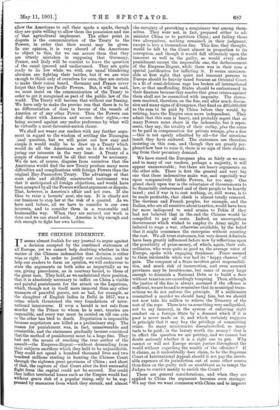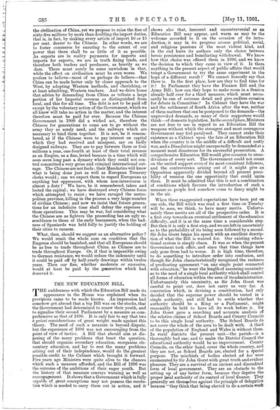THE CHINESE INDEMNITY.
IT seems almost foolish for any journal to argue against a decision accepted by the combined statesmen of all Europe, yet we cannot help doubting whether in this matter of the Chinese indemnities that decision is either wise or right. In order to justify our rashness, and to help our readers to form an opinion, we will endeavour to state the arguments on both sides as impartially as we can, giving precedence, as in courtesy bound, to those of the great men. They hold, as we understand their position, that it is absolutely necessary to inflict on China a visible and painful punishment for the attack on the Legations, which, though not in itself more immoral than any other massacre of peaceful guests, not so bad, for example, as the slaughter of English ladies in Delhi in 1857, was a crime which threatened the very foundations of inter- national intercourse. If even a herald is not safe from murder by the Prince to whom he is sent, treaties are impossible, and every war must be carried on till one side or the other has bled to death. Negotiation is impossible because negotiators are killed as a preliminary step. The reason for punishment was, in fact, unanswerable and irresistible, and the statesmen gradually became convinced that the method of punishment must be a huge fine. They had not the means of reaching the true author of the assault—the Empress-Regent—without demanding from their subjects sacrifices which they held to be unjustifiable. They could not spend a hundred thousand lives and two hundred millions sterling in hunting the Chinese Court through the eighteen great provinces of China ; and short of that, the capture of that Court after its first successful flight from the capital could not be secured. Nor could they inflict territorial losses such as the Empire would feel without grave risk of a popular rising, only to be sup- pressed by massacres from which they shrank, and almost the certainty of provoking a sanguinary war among them- selves. They were not, in fact, prepared either to ad- minister China or to partition China; and failing those two alternatives, nothing remained, in their judgment, except to levy a tremendous fine. This fine, they thought, would be felt by the Court almost in proportion to its corruption, and though it would, fall ultimately upon the innocent as well as the guilty, so would every other punishment except the impossible one, the dethronement of the Empress-Regent, while there was in their eyes a special justification for inflicting it. It seems unreason- able at first sight that quiet and innocent persons in Europe should be heavily taxed because an Oriental Court in a fit of semi-delirious rage has broken all international law, or that unoffending States should be embarrassed in their finances because they resolve that great crimes against them shall not be committed with impunity. The states- men resolved, therefore, on the fine, and after much discus- sion and many signs of divergence, they fixed on £65,000,000 as the sum to be paid by China before they would, by retiring, leave the Empire once more independent. They admit that this sum is heavy, and probably regret that so many Powers must share in the indemnity, but it repre- sents, they say, the totality of their outlay, plus the sums to be paid in compensation for private wrongs, plus a fine —this is not openly admitted by all—for the atrocious insult they have endured. The statesmen are therefore insisting on this sum, and though they are greatly per- plexed how best to raise it, there is no sign of their shrink- ing from their pecuniary demand.
We have stated the European plea as fairly as we can, and to many of our readers, perhaps a majority, it will appear unanswerable ; but there are heavy arguments on the other side. There is first the general and very big one that these indemnities make wax, and especially war upon comparatively feeble Powers, far too easy. One grand check upon war is the reluctance of Governments to be financially embarrassed and of their people to be heavily taxed ; a,nd if war is to cost nothing, or, still worse, is to be made profitable, that check is almost totally removed. The German and French peoples, for example, and the Italian, who are all sensitive about taxation, would have been far more indisposed to send armies to Pekin if they had not believed that in the end the Chinese would be compelled to pay all costs. Indeed, an unscrupulous Government which wished to employ its Army might be induced to wage a war, otherwise avoidable, by the belief that it might commence the enterprise without counting the cost. We all trust statesmen, but very decent Admirals have been greatly influenced before now by reflections upon the possibility of prize-money, of which, again, their sub- ordinates, who were quite as good as the average voter of Europe, spoke with engaging frankness. Peace seemed to them intolerable while wax had its "happy chances" of gain. The conquest of a State involves great responsibili- ties, and much risk of insurrection, and even annexed provinces may be troublesome, but sums of money large enough to diminish a National Debt or to build a fleet without taxation are exceedingly tempting. Then, although the justice of the fine is always assumed if the offence is sufficient, we are bound to remember that in municipal trans- actions we do not enforce the principle. If a millionaire committed a murder we should hang him, but we should not now take his million to relieve the Treasury of the cost of the rope. There is to us something very undignified, not to say immoral, in the system of enforcing right conduct on a foreign State by a demand which if it is poor is never made on it, and which certainly suggests in principle that it may buy the privilege of committing crime. So many missionaries disembowelled, so many teals to be paid; is the luxury worth the money ? that is in effect the question we are putting, and we cannot but doubt seriously whether it is a right one to put. Why cannot or will not Europe secure justice throughout the world without regarding the wealth of the offender ? If it claims, as it undoubtedly does claim, to be the Supreme Court of International Appeal, should it not pay the inevit- able expenses of its jurisdiction out of some other source than fines on the guilty rich so exorbitant as to tempt the Judges to convict merely to enrich the Court?
These are general considerations, and when they are applied to China the argument becomes even stronger. We say that we want commerce with China and to improve the civilisation of China, yet we propose to raise the fine of sixty-five millions by more than doubling the import duties, that is, in fact, by making every article of import 10 or 15 per cent. dearer to the Chinese. In other words, we are to foster commerce by ensuring to the extent of our power that there shall be as little of it as possible. As exports are in reality payments for imports and imports for exports, we are in truth fining trade, and therefore both traders and producers, as heavily as we dare. There must surely be some unwisdom in that, while the effect on civilisation must be even worse. We profess to believe—most of us perhaps do believe—that China can be made better only by closer approach to the West, by adopting Western methods, and cherishing, or at least admitting, Western teachers. And we drive home that advice by demanding from China as tribute a large portion of her Imperial revenue as distinguished from local, and this for all time. The debt is not to be paid off except by the voluntary action of the Government, which we all know will take no action in the matter, and the interest therefore must be paid for ever. Because the Chinese Government in • 1900 did a wicked act, therefore the Chinese for generations to come are to go without the army they so sorely need, and the railways which are necessary to bind them together. It is not, be it remem- bered, as if the Chinese were to pay interest on capital which they had received and misspent, say on badly designed railways. They are to pay between three or four millions a year, one-fourth at least of their total revenue as an Empire, as a fine, levied because in a time which will soon seem long past a dynasty which they could not con- trol committed a very gross and criminal international out- rage. The Chinese are not fools ; their Mandarins will know what is being done just as well as European Treasury clerks would ; can we expect them to regard Europeans as anything but oppressors, with whom non-intercourse is almost a duty ? We have, be it remembered, taken and looted the capital ; we have destroyed every Chinese force which attempted to resist ; we have ravaged the metro- politan province, killing in the process a very large number of civilian Chinese; and now we insist that future genera- tions for an indefinite time shall defray the expenses of those operations. This may be war, but considering what the Chinese are as fighters the proceeding has an ugly re- semblance to those of the early buccaneers, when the bad- ness of Spaniards was held fully to justify the holding of their cities to ransom. • What, then, should we suggest as an alternative policy ? We would remit the whole sum on condition that the Empress should be banished, and that all Europeans should be as free to trade throughout China as Chinese are to trade throughout Europe. Or, if that is impossible owing to German resistance, we would reduce the indemnity until it could be paid off by half-yearly drawings within twelve years. Then our fine, whether moderate or excessive, would at least be paid by the gmeration which had deserved it.







































 Previous page
Previous page